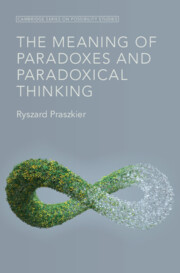Book contents
- The Meaning of Paradoxes and Paradoxical Thinking
- Cambridge series on possibility studies
- The Meaning of Paradoxes and Paradoxical Thinking
- Copyright page
- Contents
- Figures
- Tables
- Acknowledgments
- Introduction
- Part 1 Paradoxes and What They Do to Us
- Introduction
- Chapter 1 Defining the Concepts
- Chapter 2 Mind and Paradoxes
- Chapter 3 The Influence of Paradoxical Thinking and How to Evaluate It
- Discussion and Summary
- Part II Sudden Unexpected Changes
- Part III Challenging the Impossible
- Part IV Peace and Its Challenges
- Part V Paradoxes and Creativity
- Part VI Paradoxes in Action
- References
- Index
Chapter 1 - Defining the Concepts
from Part 1 - Paradoxes and What They Do to Us
Published online by Cambridge University Press: 04 April 2025
- The Meaning of Paradoxes and Paradoxical Thinking
- Cambridge series on possibility studies
- The Meaning of Paradoxes and Paradoxical Thinking
- Copyright page
- Contents
- Figures
- Tables
- Acknowledgments
- Introduction
- Part 1 Paradoxes and What They Do to Us
- Introduction
- Chapter 1 Defining the Concepts
- Chapter 2 Mind and Paradoxes
- Chapter 3 The Influence of Paradoxical Thinking and How to Evaluate It
- Discussion and Summary
- Part II Sudden Unexpected Changes
- Part III Challenging the Impossible
- Part IV Peace and Its Challenges
- Part V Paradoxes and Creativity
- Part VI Paradoxes in Action
- References
- Index
Summary
This chapter defines paradoxes. It reviews several definitions, demonstrating the difference between contradictions and paradoxes. The essence of paradoxes is that they deliver a certain truth and a higher-level meaning. Contradictions are conflicting elements within the same system, whereas paradoxes are conflicting elements that reveal a previously unknown truth. A definition derived from the field of psychotherapy is also mentioned: Paradoxes are best characterized as unacceptable conclusions derived by apparently acceptable reasoning from apparently acceptable premises. Paradoxes are also seen as unacceptable conclusions derived from apparently acceptable reasoning based on seemingly acceptable premises. The definition proposed for this book is “a statement that is seemingly contradictory or opposed to common sense and yet is perhaps true,” including the broader notion of an “air of absurdity,” provided that this absurdity carries a higher-level meaning. Some historical examples are presented, such as Achilles never catching up with a much slower tortoise, the arrow paradox, the paradox of place, the liar paradox, identity paradox, and the paradox of the stone.
Keywords
- Type
- Chapter
- Information
- The Meaning of Paradoxes and Paradoxical Thinking , pp. 15 - 18Publisher: Cambridge University PressPrint publication year: 2025

